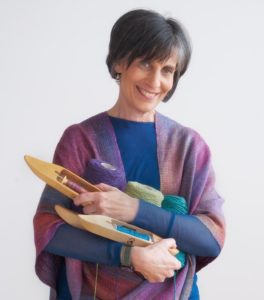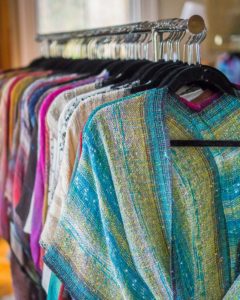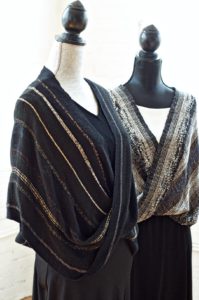By Peg Lopata, Contributing Writer

Newton – Being downsized does not necessarily have to mean being downgraded. For Hetty Friedman, 68, leaving her thirty-year corporate career in clothing manufacturing when she was 55 meant starting her own business.
“Now, I combine my love for weaving and design with my experience in business to run Hetty Friedman Designs,” said Friedman.
Friedman loves being a weaver—she began weaving when she was 13 years old and only stopped when she had two children and a full-time job.
“Weaving for me is a place of comfort,” she said, “I noticed the year my mother died, I wove more than I’d ever done before. No matter what’s going on, I can weave and feel a ‘knowing.’”

She loves working with fibers, especially rayon and bamboo, for her scarves, shawls, and other wearable art. She uses cotton for table linens.
“They are very soft, hand-washable, very drapey,” says Friedman who also expressed her fondness of looms. “I love the order and structure of the loom,” she said. “I find color emits emotions. The textures and colors of the yarn seduce me,” says Friedman of her love for color. “The rainbow is my inspiration.”
She is not hesitant to use multiple colors. In one of her shawls, she used about seventeen different colors. “When customers react to my work, it is the color that usually grabs them first,” she said.
A vast array of colors is available to Friedman because she dyes her yarns. She explained, “I apply dye to white yarn as a painter would to a canvas.” She also works with a group of Mayan women backstrap weavers in Guatemala for dyeing. “I’m able to design color combinations that they dye under my supervision. The combinations are limitless,” she said.
Working with these weavers has been and still is an important part of her life. While in college, she was told to visit Central American weavers. “A professor said to me that if I was going to be a weaver, I should visit the women who weave as a part of their everyday life and where weaving is fundamental to their society,” said Friedman. “I spent the year after graduating from college waitressing to make money to make that visit.” On that journey in 1974, she learned the art of backstrap weaving.

Friedman did not return to Guatemala until 2006 when she volunteered with a fair-trade weaver’s cooperative there. “Now I bring down yarn and commission them to weave my designs that I sell here in the U.S.,” said Friedman. “I usually go two or three times a year to work with the weavers. I lead educational and cultural tours where women learn about indigenous culture, meet artisans, visit a Mayan shaman, and with non-profits that work in reproductive health and education. It’s all about women supporting women.”
With travel not possible at the moment, she uses online tools to maintain her personal connections and continue her business. In fact, she’s currently working with the women’s weaver’s co-op to make handwoven masks. “These should be available in my online shop by the end of October,” said Friedman.
Her work can be found here: https://www.etsy.com/shop/hettyfriedman, and to learn more about her, visit her website: www.hettyfriedmandesigns.com. People are also welcome to visit Friedman by appointment in her studio in Newton or watch her at work here:












